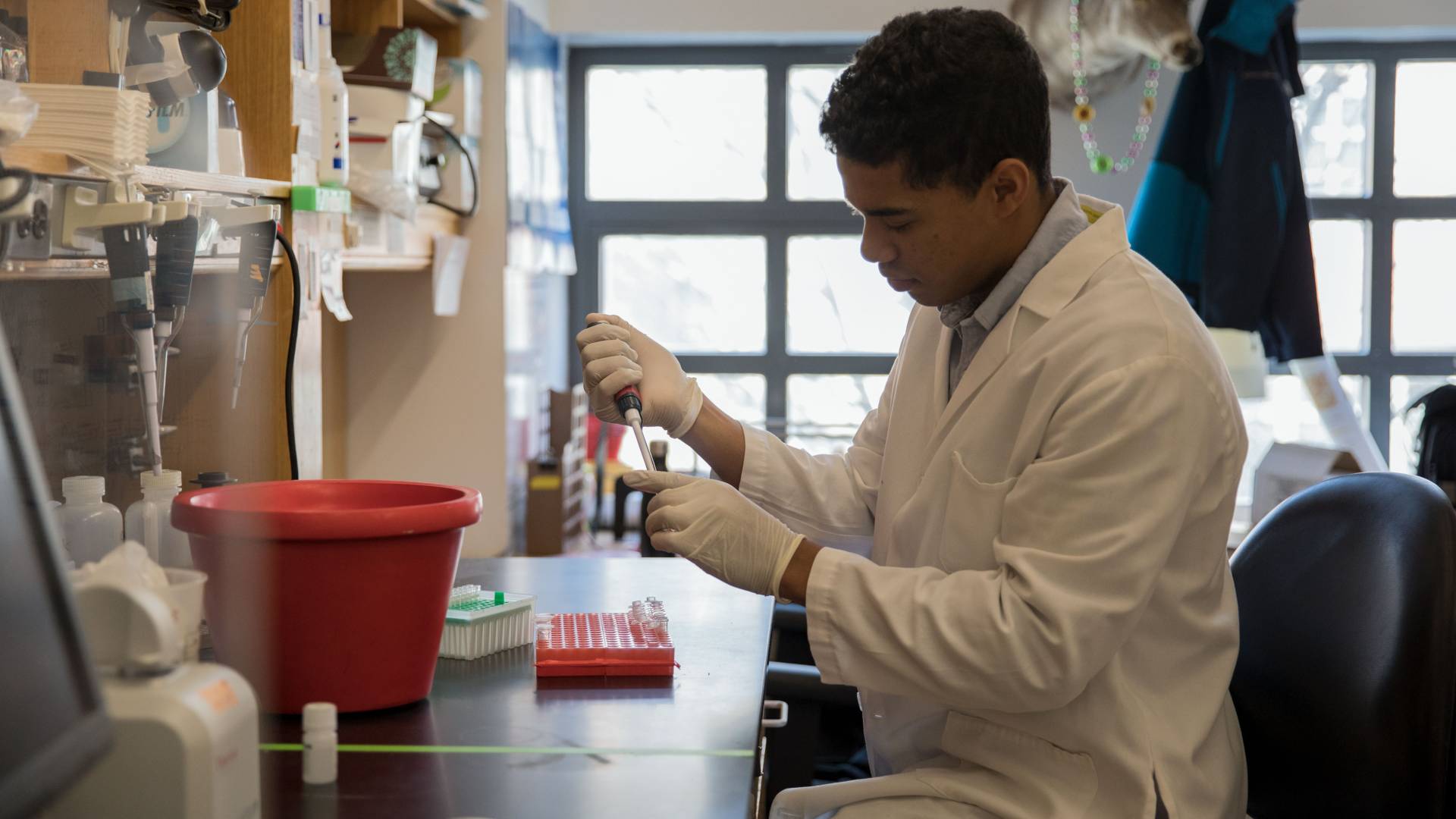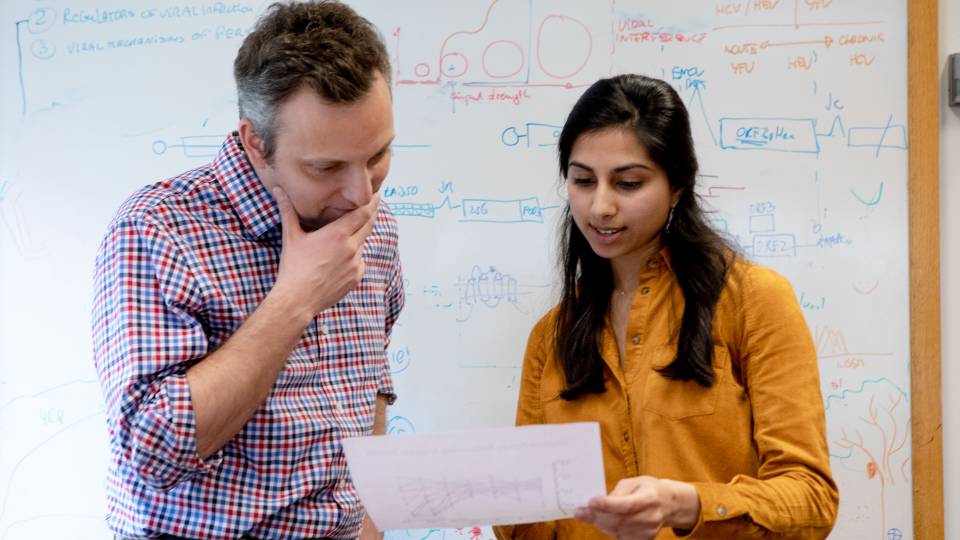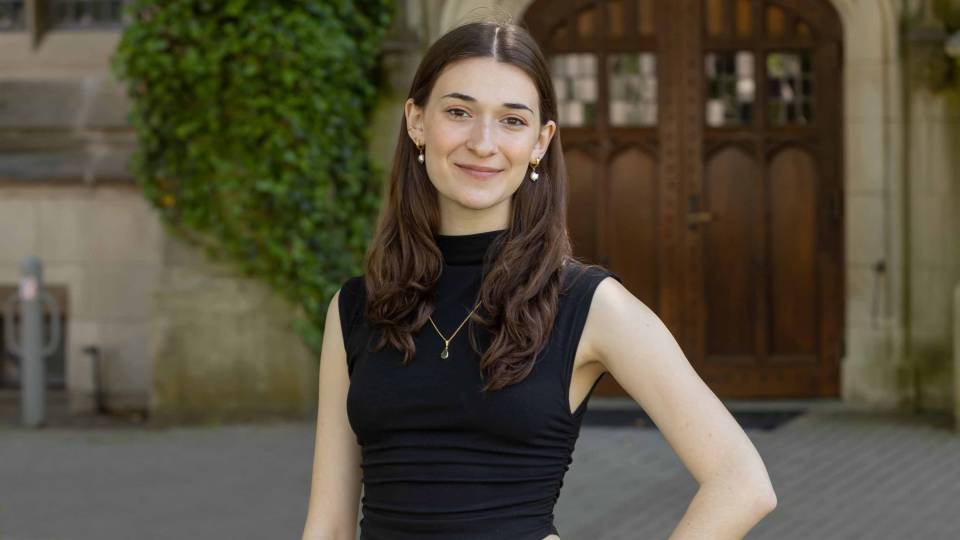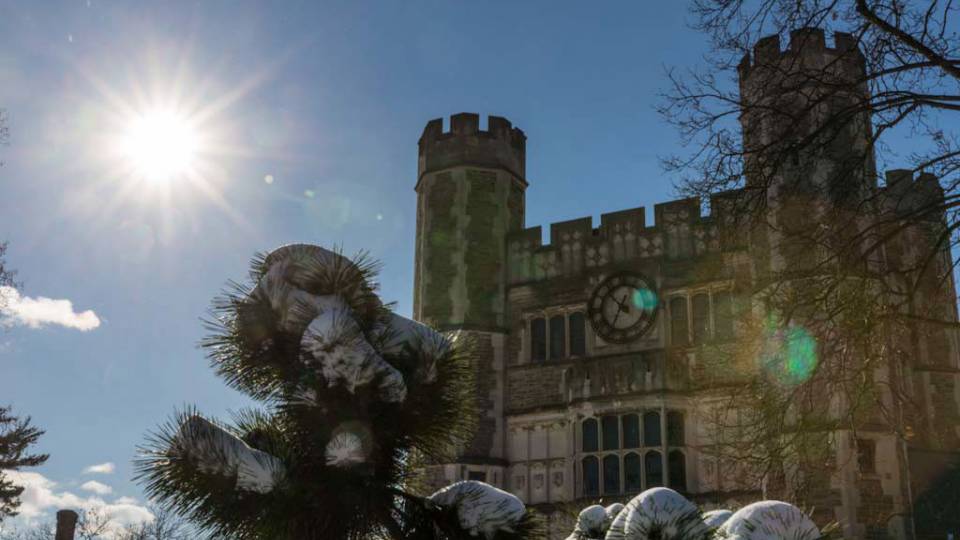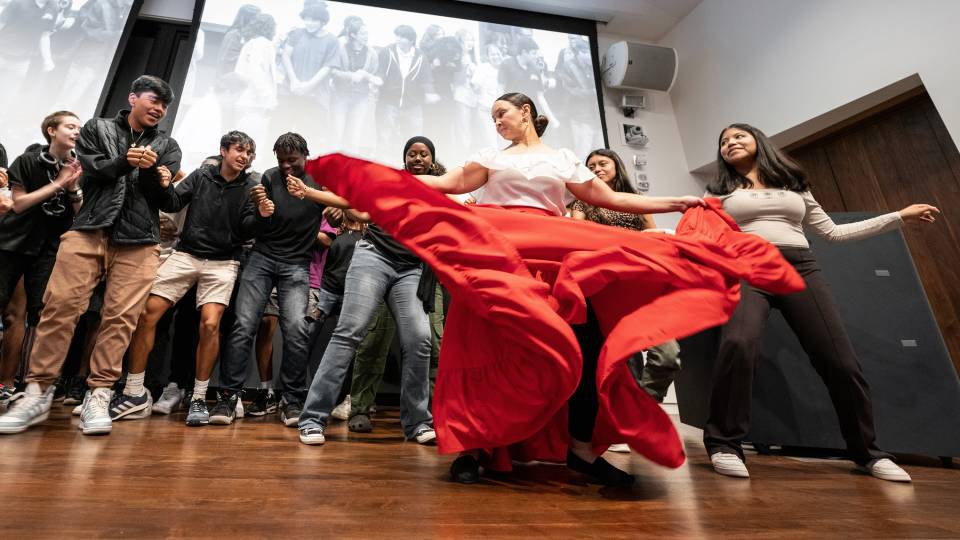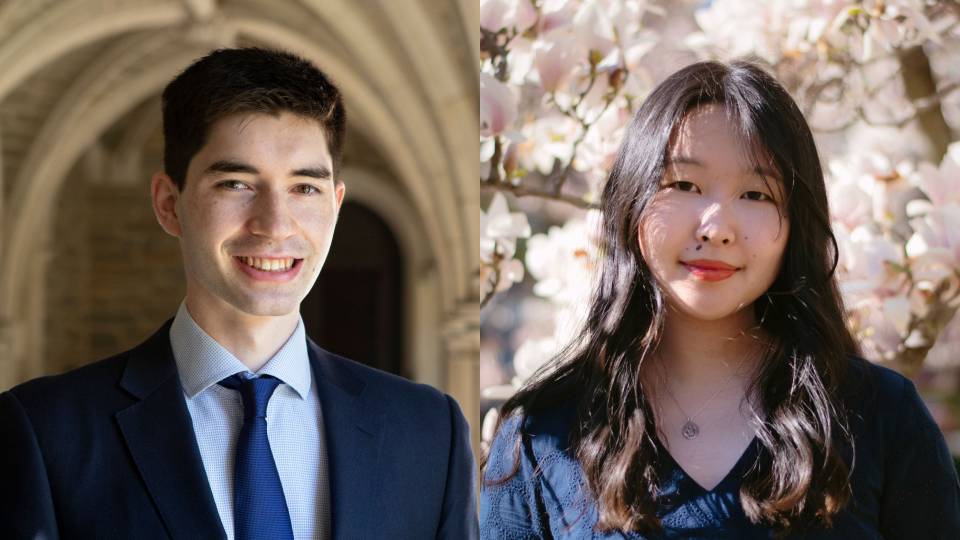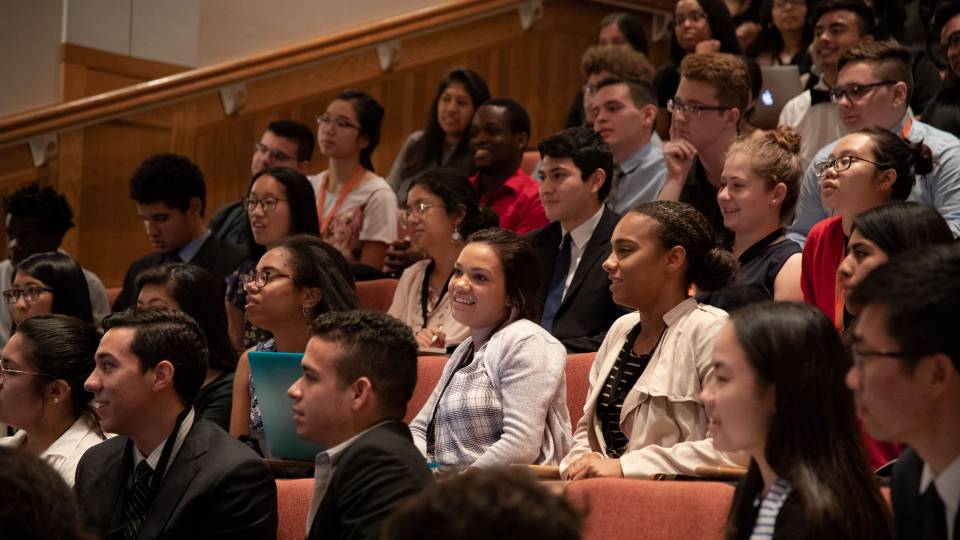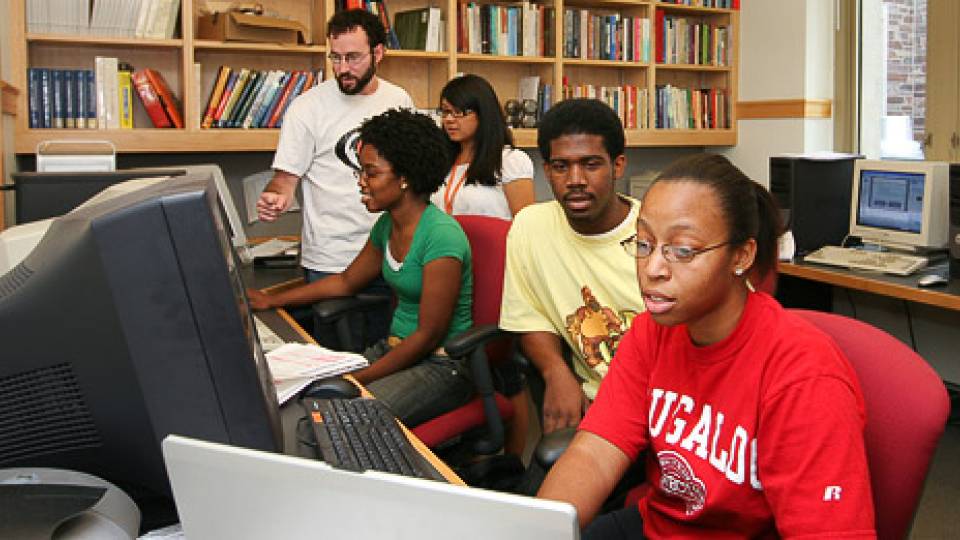Senior Gaby Joseph is a pre-med student and molecular biology major at Princeton. The Health Professions Advising office helped him select courses, plan his pre-med path, find summer internships and apply to medical schools. Joseph was recently named a Knight-Hennessy Scholar and will start at Stanford University School of Medicine this fall. In this photo, he is working with a water-based solution in a laboratory.
Your chemistry grades don’t define your future in medicine. Good doctors aren’t made by good science grades alone, says Kate Fukawa-Connelly, director of Princeton’s Health Professions Advising office.
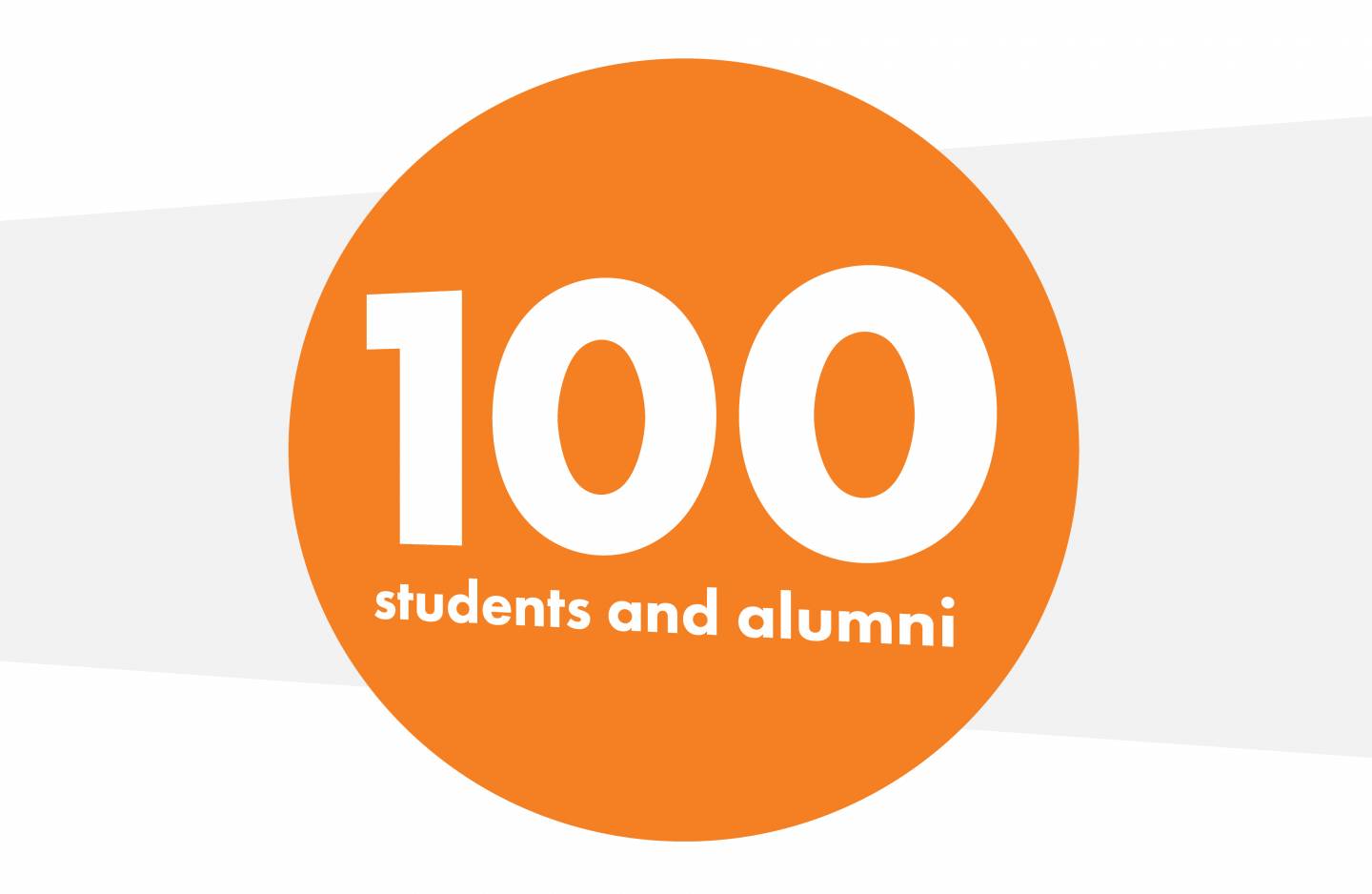
Health Professions Advising (HPA) helps students and alumni as they consider a medical or health care career. Each year, HPA assists more than 100 students and alumni who apply to medical, dental and other professional schools. The office also works with undergraduates throughout their time at Princeton, helping students explore academic and career options starting their first year on campus.
Nor are doctors defined by their family backgrounds, how high they scored on standardized tests or their college majors.
“A lot of people assume there is only one type of person or one route to becoming a doctor,” Fukawa-Connelly said. “That is wrong. The health care system needs many different people with diverse talents and experiences.”
Health Professions Advising (HPA) helps any student considering a medical or health care career. The office works with undergraduates throughout their four years at Princeton and with alumni who apply to medical, dental and other professional schools. HPA is part of the Office of the Dean of the College.
“While strong academics and test scores are important, they are not the only things,” Fukawa-Connelly said. “Personal qualities such as integrity and intellectual curiosity, meaningful extracurricular activities, and an ability and desire to serve others are essential to becoming a successful health professional.”
HPA advisers provide personalized support, getting to know each student to support their career goals. Advisers help students select courses; connect them with internships and research opportunities; write letters of recommendation; teach them about requirements for medical and other schools; and guide students and alumni through the long application and interview process.
Unlike its peer schools, Princeton does not have a medical school. The experiences offered through HPA can provide undergraduates some of the best exposure to careers in medicine. Students also are encouraged to explore different paths in and outside of health care.
“Most people have some idea what a doctor does, but they’re less familiar with the work of nurse practitioners or public health professionals,” Fukawa-Connelly said. “We want students to reflect on their interests and not just pick pre-med by default.”
But at the same time, she said, “we believe that anyone who has the drive, work ethic and personal qualities to get to Princeton has the potential to succeed as a doctor — it’s a privilege to support the next generation of physicians.”
Doing more to help more students
Dr. Archana Pradhan, a Class of 1992 graduate, said HPA has come a long way since she was a student. Pradhan is associate dean for education at Rutgers-Robert Wood Johnson Medical School in New Brunswick, New Jersey.
“I remember going to HPA and they would tell you whether your grades were good enough to apply to med school. That was the end of the conversation,” she said. “Now it is so much more than just writing a recommendation to get into medical school. Students who take advantage of HPA can use it as a true developmental tool.”
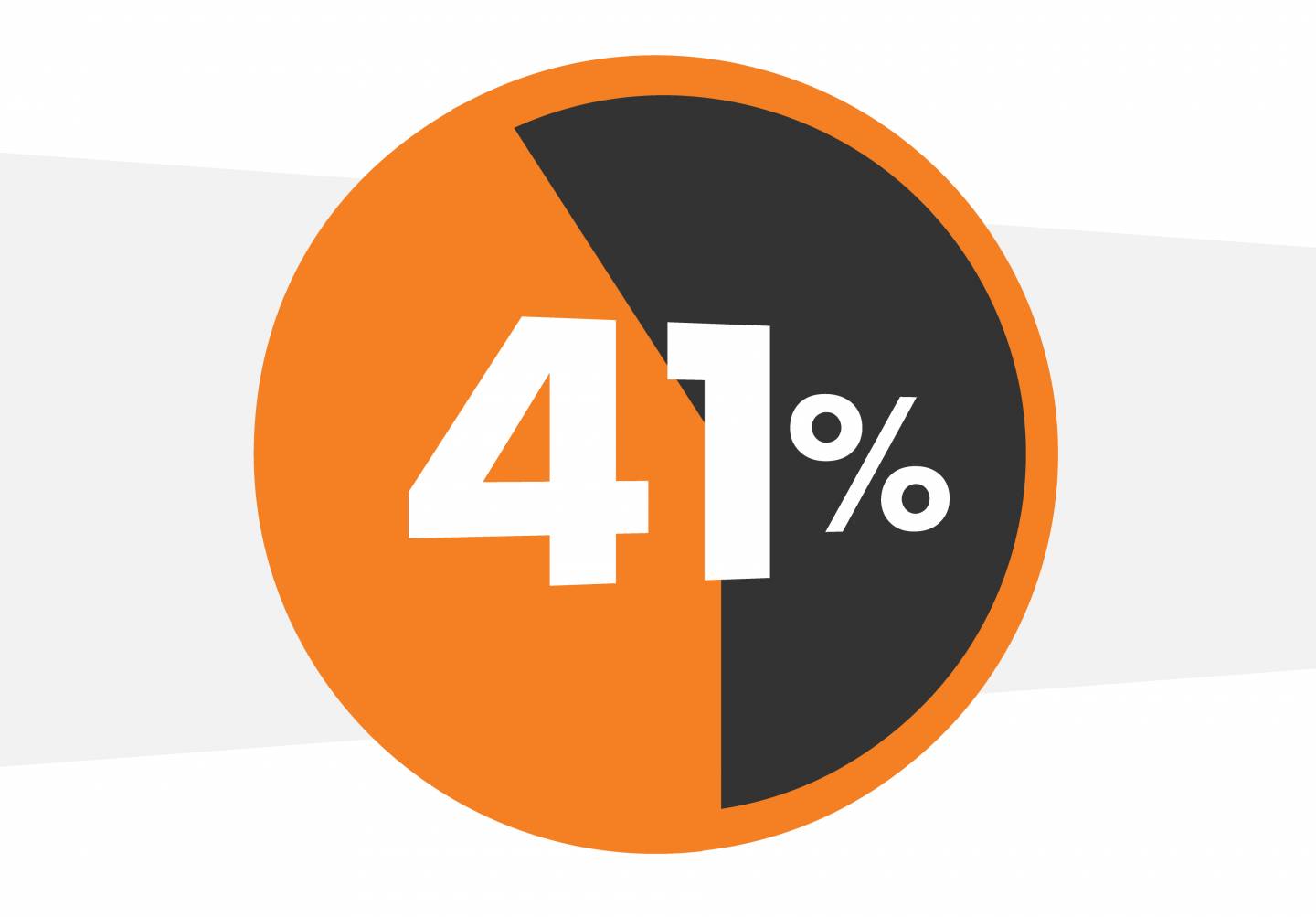
The University’s pool of medical school applicants has diversified in recent years, mirroring national efforts to encourage more underrepresented students to pursue medical careers. This year, HPA worked with 111 medical school applicants and 41 percent identified as underrepresented minorities, first-generation college students and/or from disadvantaged backgrounds.
The University’s pool of medical school applicants also has diversified considerably. This mirrors national efforts to encourage underrepresented students to pursue medical careers and diversify the physician workforce for the benefit of society.
“Diversity in medicine means a lot of things,” Fukawa-Connelly said. “We have students who are underrepresented minorities, those who are first-generation college and low-income students. Our students represent a range of academic interests: we have students from every major going to medical school.”
Each year, HPA assists more than 100 students and alumni applying to medical and other health professional schools. HPA worked with 111 medical school applicants who hope to start medical school in fall 2018. Forty-six applicants (or 41 percent) identified as underrepresented minorities, first-generation college students and/or from low-income or disadvantaged backgrounds. This compares with 29 out of 128 applicants (or 23 percent) five years ago.
The increase reflects broader efforts at Princeton to enroll more students from diverse backgrounds, Fukawa-Connelly said. She added that students today are also less hesitant to self-identify this way.
“Sometimes students applying to medical school will think: ‘I made it to Princeton, how could I possibly be disadvantaged?’ But organizations like the Freshman Scholars Institute and Hidden Minority Council help students recognize the distance they have traveled to arrive here relative to some of their peers,” she said. “HPA advisers seek to know all pre-health students holistically in order to provide them individualized guidance and support.”
The following perspectives highlight HPA’s work with Princetonians pursuing medical careers.
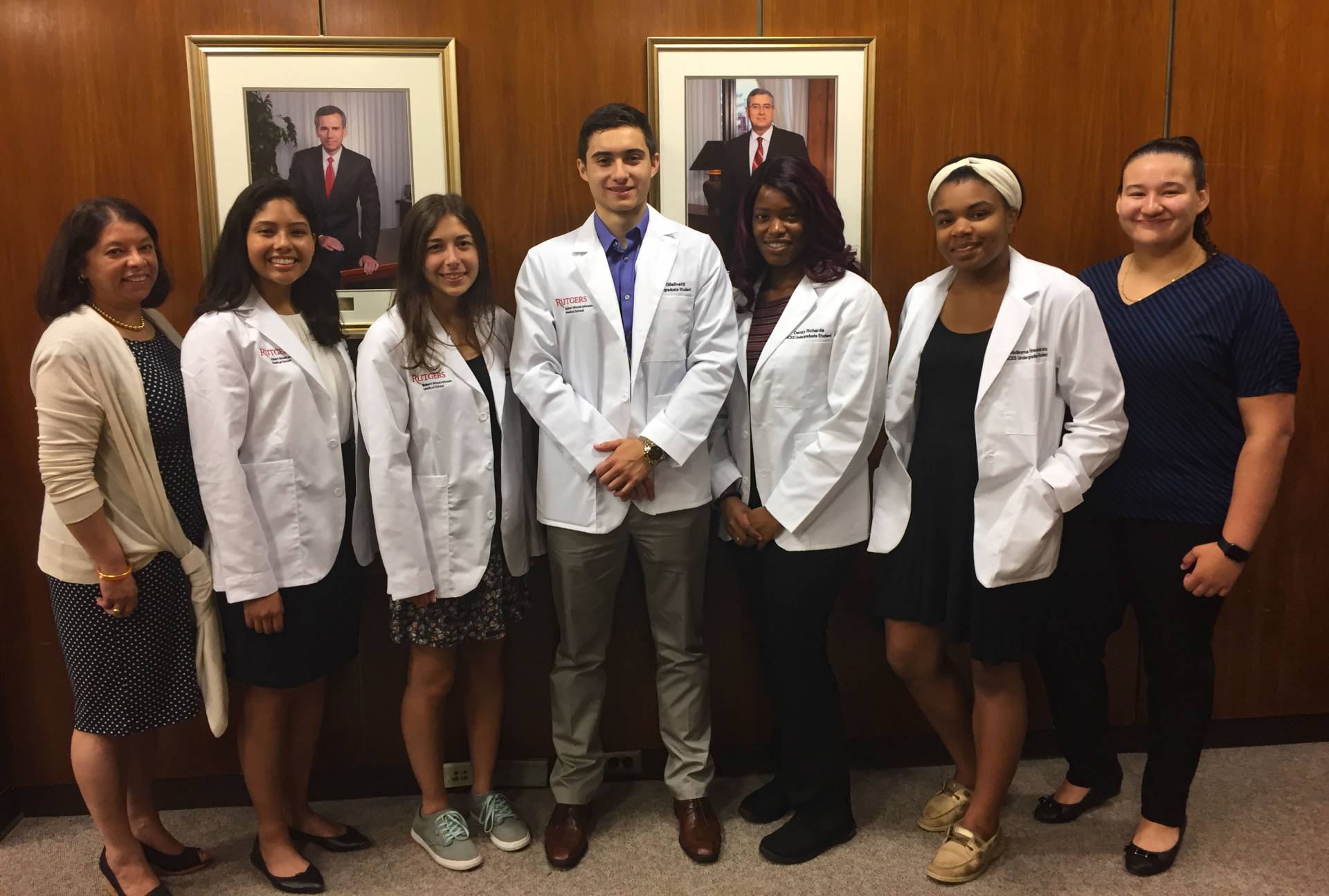
Class of 1992 graduate Dr. Archana Pradhan developed the Academic Clinical Experience Summer (ACES) program to give Princeton sophomores the chance to experience life as a medical student at Rutgers-Robert Wood Johnson Medical School. (From left to right) Pradhan welcomes last summer’s Princeton interns, Class of 2019 members Fernanda Fernandez, Rebecca Mindel, Mateo Gilsilveti, Denay Richards and Chidinma Nwachukwu, along with medical school student Cassandra Soto.
Undergraduates pursue their passions
Many undergraduates come to HPA desiring a career in medicine but not knowing how to get there.
“I’ve always been interested in science and medicine, but I was not sure what to major in,” said senior Gaby Joseph, who eventually selected molecular biology. “My first contact with Health Professions Advising was their handbook for incoming classes. It has everything you need to know about requirements and potential courses if you want to apply to medical school. It was extremely helpful and really set me on my way.”
HPA also connected Joseph with summer internships, including one with Class of 1985 graduate Dr. Charles Cobbs. Cobbs is a neurosurgeon and director of the Ben and Catherine Ivy Center for Advanced Brain Tumor Treatment at Swedish Medical Center in Seattle.
“HPA knows a ton of alumni physicians interested in helping students,” Joseph said. “Dr. Cobbs has become a great mentor. I shadowed him during brain tumor removal surgeries and worked in his lab testing tumor samples. It was a really amazing cross-section of research and hands-on medical experience.”
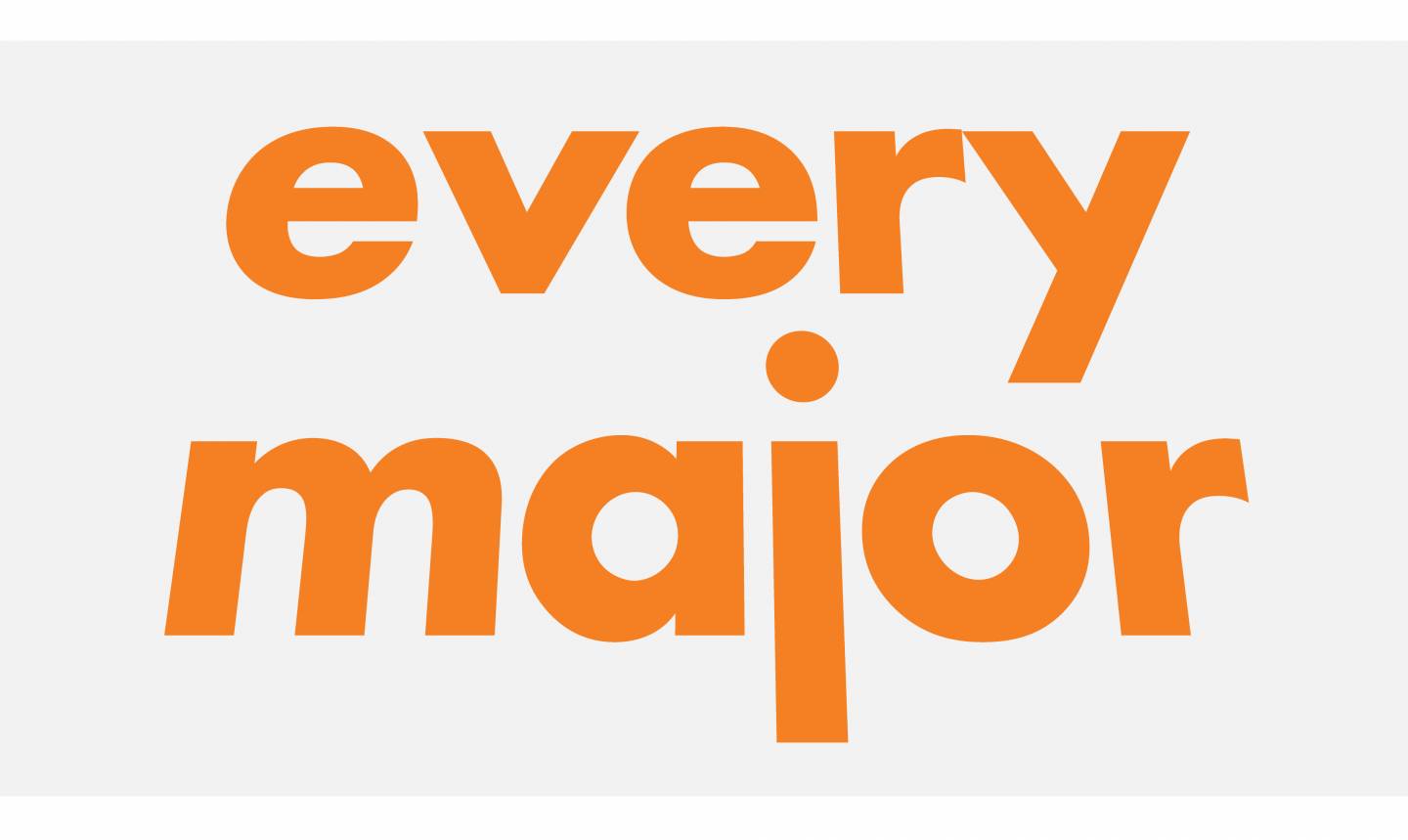
Princeton students from every major apply to medical and other health professional schools. HPA Director Kate Fukawa-Connelly said advisers work individually with students to find their passions and show them different ways that a health care career may be possible.
When it came time to apply to medical school, Joseph said HPA was invaluable.
“The advisers are an awesome resource throughout each step of the process,” he said. “They really get to know each applicant and advocate on your behalf. My adviser helped immensely with my essays, teasing out my motivations and how my experiences will inform my work as a physician. HPA also wrote an extraordinary recommendation letter and prepared me for admission interviews.”
The work paid off: Joseph was recently named a Knight-Hennessy Scholar and will start at Stanford University School of Medicine this fall.
“The medical field can be a very long road and there are a lot of hurdles to become a doctor. It is essential to have mentors to help you get from one step to the next,” said Joseph, who now mentors other undergraduates as an HPA peer adviser.
Junior Fernanda Fernandez agreed about the importance of mentors. Fernandez grew up in Rutherford, New Jersey, and the only doctor she knew was an uncle in Peru.
“I really liked dissections in high school biology and thought I may do research as a career,” she said. “But then I visited my uncle and shadowed his work at a hospital emergency room. I liked the action and helping patients directly.”
At Princeton, Fernandez learned about HPA while attending the Freshman Scholars Institute the summer before her first year.
“I was lucky to have exposure to HPA very early on,” she said. “I started attending their aspiring-doctor dinners. I went in sophomore year when I had organic chemistry crises, or when I was unsure about my major. I was torn between neuroscience, computer science, molecular biology and chemistry. They helped me choose neuroscience.”
She also trained to become an emergency medical technician, and now volunteers with the Princeton First Aid and Rescue Squad.
And this past summer, she attended the Academic Clinical Experience Summer (ACES) program, a new collaboration between Princeton and Rutgers-Robert Wood Johnson Medical School. The six-week program is for Princeton sophomores from disadvantaged backgrounds who are seriously considering a career in medicine. ACES was developed by Pradhan and is among a few medical school partnerships that give Princeton students early exposure to life as a physician.
“The summer was phenomenal,” Fernandez said. “We were treated like real med students, taking anatomy and physiology courses. We also shadowed medical students and physicians. I did rounds with a family medicine doctor and observed her patient consults. I got to ask a ton of questions, even things like how she balances being a doctor and a mother.”
Fernandez said the experience cemented her interest in becoming a doctor, while also preparing her for medical school.
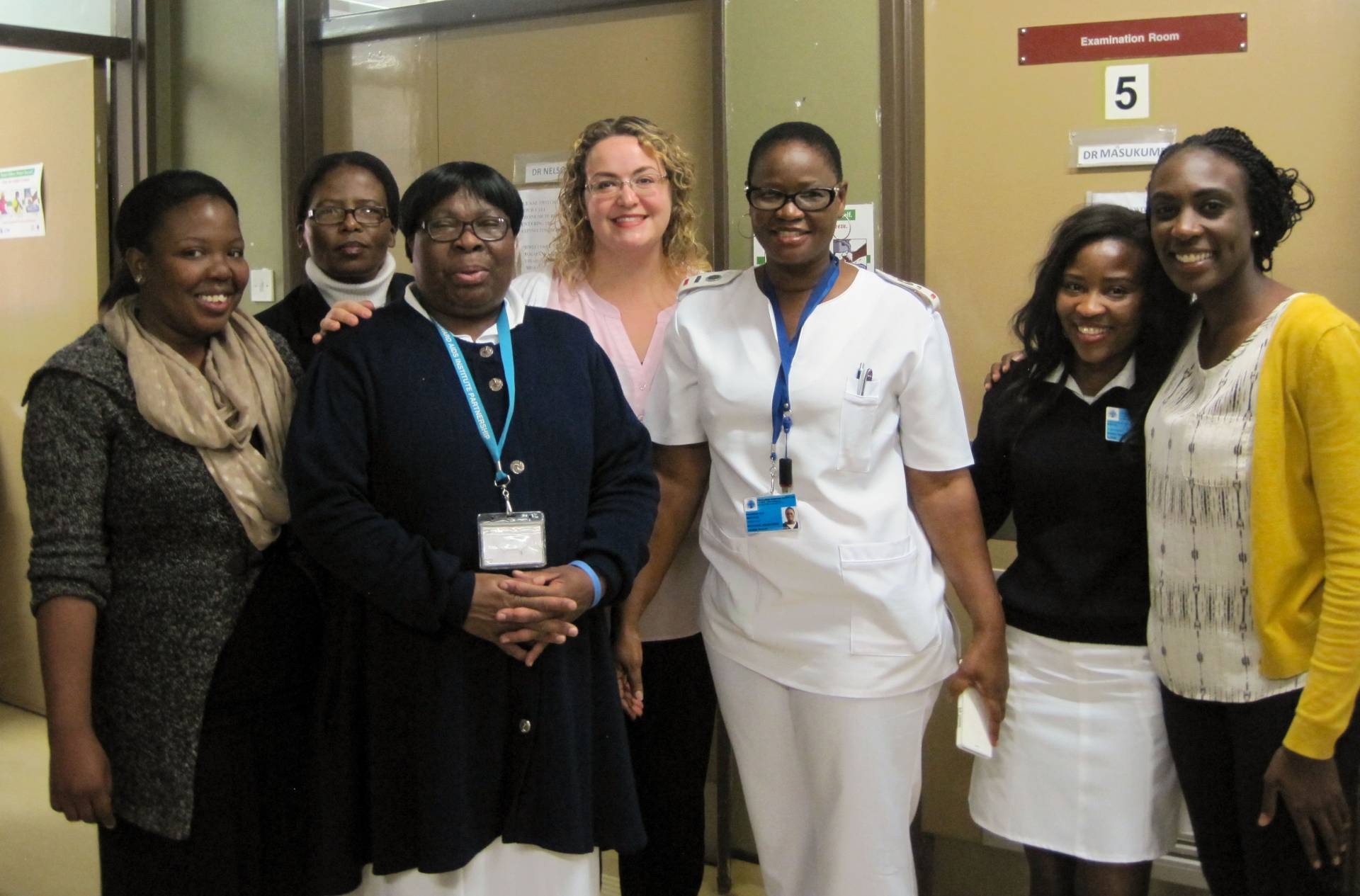
Class of 2009 graduate Agatha Offorjebe (far right) stands with nurses at Antenatal Clinic at Princess Marina Hospital in Gaborone, Botswana, where she conducted research between her first and second years of medical school. Offorjebe is a medical student at the Charles R. Drew/UCLA Medical Education Program, and says the support and advice of Princeton’s HPA office helped her get into her first-choice school.
Medical students stay connected to HPA
HPA extends its resources to alumni, as it has become more common for students to take a gap between college and medical school.
Agatha Offorjebe graduated in 2009 unsure if she wanted a career in public health or medicine. She majored in ecology and evolutionary biology and was a peer health adviser and student wellness leader on campus.
After graduation, she moved to Botswana as a Princeton in Africa fellow and worked as a curriculum development officer for an adolescent HIV support program.
“I also shadowed doctors in the clinic and hospital, and learned a lot about how to talk with patients, how to make sure they understand complex systems in their bodies and help them advocate for their own health,” she said.
The experience showed Offorjebe she could pursue a medical degree and also work in public health.
“Once I decided to apply to medical school, HPA was super helpful. Even though I was not technically on campus anymore, they still consider you part of the Princeton family,” she said.
With the guidance of HPA, Offorjebe chose the Charles R. Drew/UCLA Medical Education Program, which focuses on developing physicians to work in underserved areas. She is currently on a research fellowship in Malawi and expects to finish her final year of medical school next year.
“I ultimately hope to pursue a career in academic medicine, combining my interests in clinical work and public health research in low-resource settings,” she said. “I really owe where I am today to HPA’s support. The Drew/UCLA program was my top choice and through the program I’ve had a number of opportunities to work in underserved communities at home and abroad.”
Alumni doctors mentor the next generation
For Princetonians who now work in medicine, the importance of an office like HPA is clear.
Dr. Alexis Tingan, a Class of 2005 graduate and assistant professor of clinical physical medicine and rehabilitation at Penn Medicine, has stayed connected to HPA throughout his career and mentors Princeton students at his clinic.
“These experiences are absolutely vital for students who are considering or preparing for medical school,” Tingan said. “After all, it's impossible to know what you're in for without observing it firsthand.”
Tingan said this is especially important for students from disadvantaged backgrounds.
“They may not have any family, friends, or anyone in their community who is a physician,” Tingan said. “Therefore, they may be unprepared for the path towards becoming a physician due to the absence of someone to help them navigate the process. Having a mentor can help you chart out your journey, help you when you do stumble and ultimately help you enjoy the process.”
Pradhan said allowing students to explore medical careers is why she worked with HPA to develop the ACES program.
“I remember my first year of general chemistry, people freaked out if they got a C+. That was the end of their dream of becoming a doctor,” Pradhan said. “But it is not like that anymore. Students are given time to adjust to college, and with the support of HPA, really figure out what they want to do.”
Some students who participate in ACES are later invited to apply to Rutgers-Robert Wood Johnson Medical School through an early assurance program that allows them to bypass the MCATs.
“I know the type of students that Princeton produces and it is amazing to have them at our medical school,” Pradhan said.
Pradhan and Tingan said that the health care field also will benefit from students from underrepresented or low-income backgrounds. They noted several studies that show health outcomes may improve for certain minority groups when underrepresented minorities are part of their medical team.
“Patients treated by doctors of similar backgrounds or who speak their language may process the information better and thus have better health outcomes,” Pradhan said. “It’s not about being a better doctor, but a matter of cultural competency.”
Ultimately, the guidance and support provided by HPA as well as the mentorship of alumni physicians means a greater range of Princeton students are now pursuing medical careers.
“We don’t want to lose these students who could potentially be great doctors,” Pradhan said.
